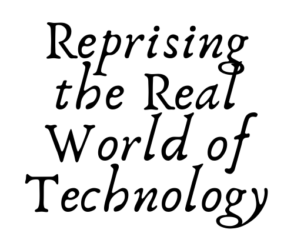Call for Papers, Special Essay Series: What Would Ursula Franklin Say (WWUFS)?
*reprinted from the McLuhan Centre for Culture & Technology
Ursula Franklin is an interdisciplinary icon: she was a pacifist, an environmental activist, a metallurgist trained in experimental physics, and a philosopher of technology. Her honour as the first woman to receive the designation of University Professor at the University of Toronto in 1984 speaks magnitudes of her influence, as well as the gendered barriers both she and her colleagues faced in the academy. She spent her academic life advocating for pacifism, gender equality, and public good values for technology, while also making great strides in the material sciences.
As a working group, our mission is to reprise and reinvigorate her legacy as both a role model and a theorist. Her groundbreaking CBC Massey Lecture series, The Real World of Technology (1989)¹, is the catalyst for this special essay series, “What would Ursula Franklin say?” Describing technology as social practice and as a system, Franklin encouraged us to examine the social class of experts, the changing nature of community, and issues of power, control, and collaboration. She argued for attentiveness to how digital technologies affect relations of time and space as well as individual and collective responsibility.
Encountering her lectures today highlights Franklin’s prescience on the moral, ethical, and practical aspects of contemporary technologies such as artificial intelligence, virtual reality, smart cities, and even dating apps. Franklin’s interdisciplinary background also made for unique materialist, practice-based analyses of media and their design, approaches that are now being taken up in various trajectories such as media archeology and new materialism. Her philosophy of technology was also uncommonly Canadian-centric, often pointing to Canadian policies and regulations which solidified inequity in the tech sector and beyond. Indeed, her work on the Science Council of Canada in the 1970s helped to shape those policies and regulations.
For this call for papers, we invite contributors to view their topics of study through the lens of Franklin’s lectures. We also strongly encourage perspectives that challenge gendered, racialized, and other marginalized boundaries in their work.
This special essay series welcomes academic and creative pieces that address Franklin-themed questions including, but not limited to:
Whose realities or experiences are/are not encompassed by our current “real world of technology” (Franklin, 1999)
How does Franklin’s work converge and contrast with that of other University of Toronto media theorists?
How has the meaning of “the house that technology has built” (Franklin, 1999) emerged, shifted, or transformed under our current technocracy?
How do contemporary design justice approaches (e.g. Costanza-Chock, 2020) subvert or support what Franklin refers to as “prescriptive” or “redemptive” technologies?
What meaning does Franklin’s message of pacifism hold in today’s world rocked by conflict, polarization, and disputed certainties and facticity? How does mediatization (and her conceptualization of a “bitsphere”) influence our understanding of uncertainty and our capacity for a peaceful future?
Franklin is deeply concerned with technology’s capacity to portend liberation, while instead often resulting in “enslavement.” How does this metaphor decenter racialized histories of slavery or colonialism? How might this metaphor be transformed to re-centre critical race theories of technology?
Franklin writes of holistic technologies as collaborative and iterative. How can we extend the practice of her vision of holistic technologies to holistic citational methodologies? Whose knowledge can we legitimize through holistic rather than prescriptive citational practices?
Submission Details
All submissions will be published in Fall 2021, via PubPub, allowing for open-access and a Creative Commons license.
Academic Submissions
Academic papers should be between 2000-4000 words, excluding references. Accepted citation styles are APA.
Creative Submissions
Creative projects include creative writing, spoken word performance videos, critical artwork, and speculative fiction. Text-based submissions should be submitted via Word Doc and be a minimum of 800 words. If you wish to submit other types of media, please email us at wwufs2021@gmail.com to confirm the format.
All submissions should be accompanied by a short bio of the author(s) (max. 150 words) and a short abstract (max. 400 words). Submissions must not have already been published or accepted for publication by another journal or conference. Submissions will go through peer review, reviewed by a senior member of the Reprising the Real World of Technology working group. They will be assessed based on significance, originality, and quality of presentation.
Please submit all materials to wwufs2021@gmail.com with the subject line “WWUFS Submission.”
Important Dates
Abstract deadline: April 1, 2021
Submission deadline: June 1, 2021
Authors notified: August 1, 2021
Materials published: Fall 2021
Sources
Ursula Franklin. (1999). The Real World of Technology, Revised Edition. Toronto: House of Anansi Press. https://houseofanansi.com/products/the-real-world-of-technology-digital
Ursula Franklin. (1989). The 1989 Massey Lectures, “The Real World of Technology.” CBC Radio. https://www.cbc.ca/radio/ideas/the-1989-cbc-massey-lectures-the-real-world-of-technology-1.2946845
Henry Trim. (2015). Planning the Future: The Conserver Society and Canadian Sustainability. NiCHE: Network in Canadian History & Environment, October 8. https://niche-canada.org/2015/10/08/planning-the-future-the-conserver-society-and-canadian-sustainability/
Sasha Constanza-Chock. (2020). Design Justice: Community-Led Practices to Build the Worlds We Need. Cambridge, MA: MIT Press.
